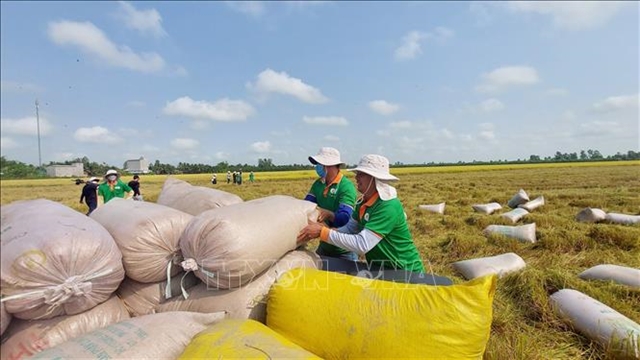 Society
Society

| A worker checks a wafer used in semiconductor manufacturing at the South Korea-invested Hana Micron Vina factory in the northern Bắc Giang Province. — VNA/VNS Photo Tuấn Anh |
HÀ NỘI — Việt Nam has tremendous opportunities to develop its semiconductor industry, but the biggest hurdle to the sector’s growth is a lack of high-quality workforce.
The semiconductor industry currently sees huge development potential with cooperation strategies in place with other countries such as Japan, South Korea and the US, said Nguyễn Phú Hùng, chief of the Department of Science and Technology for Economic Technical Branches (under the Ministry of Science and Technology - MoST).
In Việt Nam-US joint statement on upgrading bilateral ties to comprehensive strategic partnership, the countries’ leaders - General Secretary of the Communist Party of Việt Nam's Central Committee Nguyễn Phú Trọng and US President Joe Biden, also acknowledged Việt Nam’s potential as a major player in the semiconductor industry.
Hùng said: “Việt Nam definitely can become one of the countries in the global value chain of this sector.”
However, the industry demands qualified high-skilled workers to work with advanced technology.
Statistics from associations in the sector showed that Việt Nam has around 5,000 engineers in semiconductor manufacturing, Hùng said.
The MoST has identified technology transfer and coordination as the priorities for human resources training.
Vietnamese scientists and researchers based abroad are welcome to participate in the semiconductor industry development in Việt Nam.
The MoST will also propose policies that encourage local and international businesses to invest in laboratories in Việt Nam or innovation centres in institutes and universities.
The aim is to form research groups that can master and utilise the core technologies of this field.
Hùng added: “Since 2010, the Prime Minister has included semiconductors in the list of national products, however, we have yet to optimise real-life implementation.”
Enterprises with strengths in technology such as Viettel, FPT, CMC, Phenikaa as well as universities and institutes are also encouraged to work together to develop national products related to semiconductors.
This is expected to create an ecosystem that covers all the stages of production from designing to manufacturing.
The MoST puts the focus on mastering chip designs in the semiconductor value chain, as this accounts for 50-60 per cent of the product value.
The ministry will also issue investment and supporting policies related to monitoring and quality control devices to ensure that the output products meet the standards ISO/IEC 17025:2017, while also reducing production time.
This will also decrease costs as products no longer need to be sent abroad for quality checks.
The chief of the Department of Science and Technology for Economic Technical Branches also said: “We believe that with these measures and the comprehensive implementation from the ministries, sectors and the government, we can grasp the excellent opportunities that we have.”
Innovation policies
According to the Global Innovation Index 2023 published by the World Intellectual Property Organisation (WIPO) on September 27 this year, Việt Nam ranked 46th out of 132 countries and economies, rising two positions compared to the previous year.
The country was also placed third in the Southeast Asian region and second in the group of 36 economies with low-middle income.
Việt Nam, together with India and the Republic of Moldova, are considered record holders for impressive achievements in innovation compared to the country’s development rate for the 13th consecutive year.
The MoST has also completed and submitted to the Prime Minister a directive on developing the science-technology market in a comprehensive, effective, modern and integrating manner; a decree specifying the implementation of the law on intellectual property; a decree specifying the functions, tasks, scope of management and organisational structure of the MoST; a resolution transferring the Hòa Lạc Hi-tech Park from the jurisdiction of the MoST to the Hà Nội People’s Committee.
The ministry also finished the draft documents related to high-tech parks; the development and application of biotechnology for national sustainable development; comprehensive science-technology and innovation solutions to improve productivity by 2030; addressing projects using outdated technology that could pose harms to the environment; the development of national standards for quality control; and infrastructure development.
MoST officials will also accompany government leaders to seminars and bilateral meetings in Brazil, Cuba, Japan, Australia and Austria to strengthen international cooperation in the field.
In Q4-2023, the MoST will host and co-organise several major events such as Techmart 2023; Techfest Vietnam 2023, the celebration of the World Standards Day, and the meeting of the joint committee on science-technology cooperation between the Vietnamese MoST and German Federal Ministry of Education and Research, among others. — VNS




